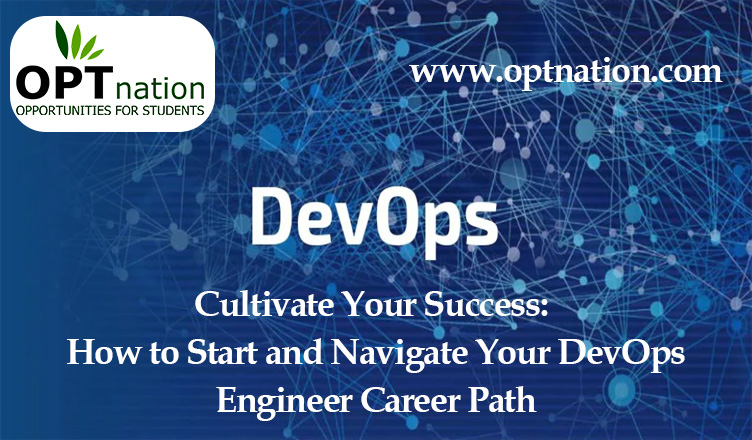Developers and operations professionals are essential in the dynamic world of technology and business. They are the link between the IT operations department and the software development team. Everyone wants to know, “How long does it take to become a DevOps engineer?”
This comprehensive blog will discuss the DevOps career path and the necessary skills required for the DevOps engineer career path in 2024.
Jumping into DevOps Career- What to know
The career growth in DevOps involves the following skills and education:
Skills and Education
Having a certain degree isn’t necessarily a must in the field of DevOps. A solid academic background in computer science, information technology, or a similar discipline can give you a competitive advantage. Professionals in the field of development operations often have bachelor’s degrees or above, which helps them to grasp intricate technological ideas and procedures better.
The career path of a DevOps engineer requires expert knowledge of a wide range of tools and technologies. Expertise in automation platforms such as Jenkins and Ansible, version control systems such as Git, and containerization technologies like Docker and Kubernetes are among the necessary technical abilities. It is often essential for DevOps engineers to have an understanding of scripting languages like Python and Shell scripting.
A successful DevOps profession requires both technical knowledge and soft skills. DevOps engineers require strong communication and collaboration skills because they often collaborate with people from other departments. Adaptability in high-pressure situations and the ability to solve complex problems are also highly prized. Critical soft skills for this industry include time management and stress tolerance during system outages.
Career opportunities and growth
Before you start a career in DevOps, first understand the career and growth opportunities:
The field of DevOps engineering is known for its high salaries and challenging work. Software delivery pipeline optimization and IT environment stability are two areas where firms are prepared to pay top dollar to recruit the best and smartest. The requirements of the work are derived from the necessity of managing complicated infrastructure, automating processes, and ensuring continuous integration and delivery (CI/CD). Solving complex technical challenges is both a financially rewarding and personally satisfying profession despite the demanding nature of the labor.
Being able to work in various settings is an excellent perk of being a DevOps engineer. The ideas of DevOps can be used by businesses of all sizes, from startups to MNCs, and in a wide variety of sectors, including healthcare and finance. Because of this adaptability, you can apply your skills and knowledge to different industries and work environments. The DevOps area allows you to work in various settings, from traditional corporations to fast-paced tech startups, allowing you to keep your career path exciting and varied.
DevOps has been more open to remote and flexible work arrangements in recent years. Many DevOps jobs can now be done remotely with the help of cloud technology and collaboration platforms, giving you more freedom to select where you work. Achieving a good work-life balance and doing away with long commutes are both made much easier with this kind of flexibility. Collaborating with teams and organizations worldwide is just one more perk of this skill set. A major perk of the DevOps career pathway is the option to work remotely, which is becoming more and more essential in the modern employment market.
DevOps career path road map
The following section discusses the career path for DevOps engineer in 2024:
Learning coding languages
Learning a programming language is an important step in becoming a DevOps professional. Scripting and programming languages like Python, Ruby, or JavaScript are necessary when it comes to automating repetitive chores, setting infrastructure, and designing custom solutions for DevOps processes. With these coding abilities, DevOps engineers can build automation scripts and systems that are efficient, scalable, and error-free.
Getting to know about operating systems
A DevOps professional’s knowledge of Windows and Unix/Linux is essential. Expertise in command line interfaces and navigating different server settings is a necessity for DevOps personnel. Being well-versed in these OSes allows for efficient setup, upkeep, and troubleshooting, guaranteeing smooth software deployments and infrastructure management.
Understanding security and network protocols
Because of the vital nature of data protection and service reliability in DevOps, security and network protocols play a vital role in this practice. Engineers working in development operations should be well-versed in secure coding practices, firewalls, encryption, and network architecture. With this information in hand, they can better create secure systems and find weak spots to protect against hazards.
Knowing IaS (Infrastructure as Code)
An essential part of the DevOps methodology is Infrastructure as Code (IaS), which enables code-based infrastructure provisioning and management. By mastering tools like Terraform, AWS Cloud Formation, or Ansible, DevOps experts can streamline, automate, and version-control the infrastructure deployment, scaling, and configuration process.
Learning code design
DevOps developers can’t compromise on code design principles when it comes to building scalable and maintainable automation scripts and applications. Coding that is modular, reusable, and easy to maintain reduces technical debt and improves the overall quality of DevOps solutions.
The Future of DevOps- Is it worth it?
Undoubtedly, the DevOps career path has a bright and valuable future. Rapid and effective software development is becoming increasingly important in today’s technology-driven society, and DevOps is well-positioned to address this demand. It’s suitable for companies that want to remain competitive, and it’s good for people who want stable employment, good pay, and opportunities to advance in a growing industry. The future of DevOps is looking quite bright, especially with its widespread adoption across multiple industries. Starting a career in DevOps requires a solid educational foundation, hands-on experience, coding proficiency, collaboration skills, continuous learning, and networking.

